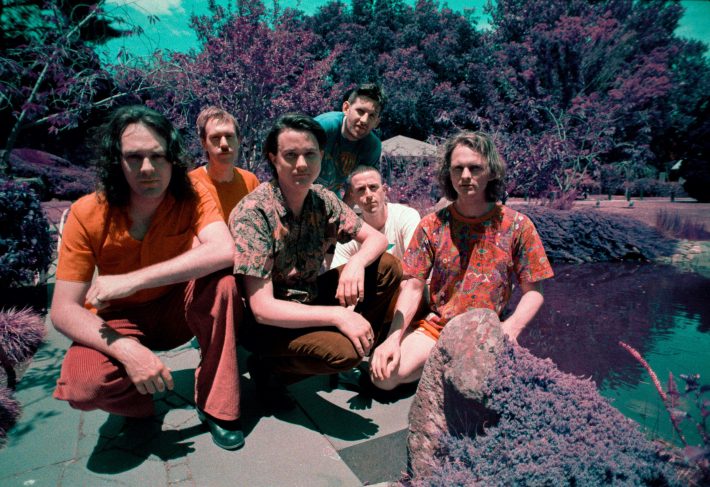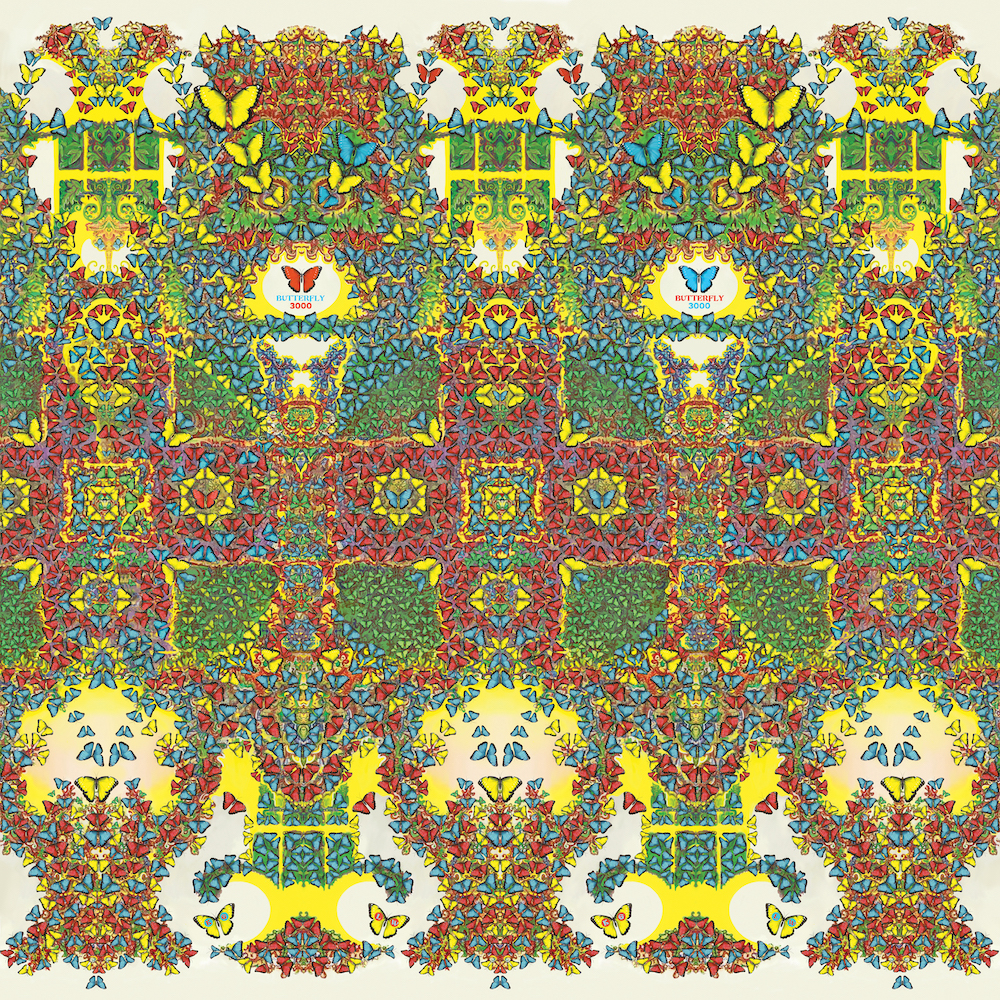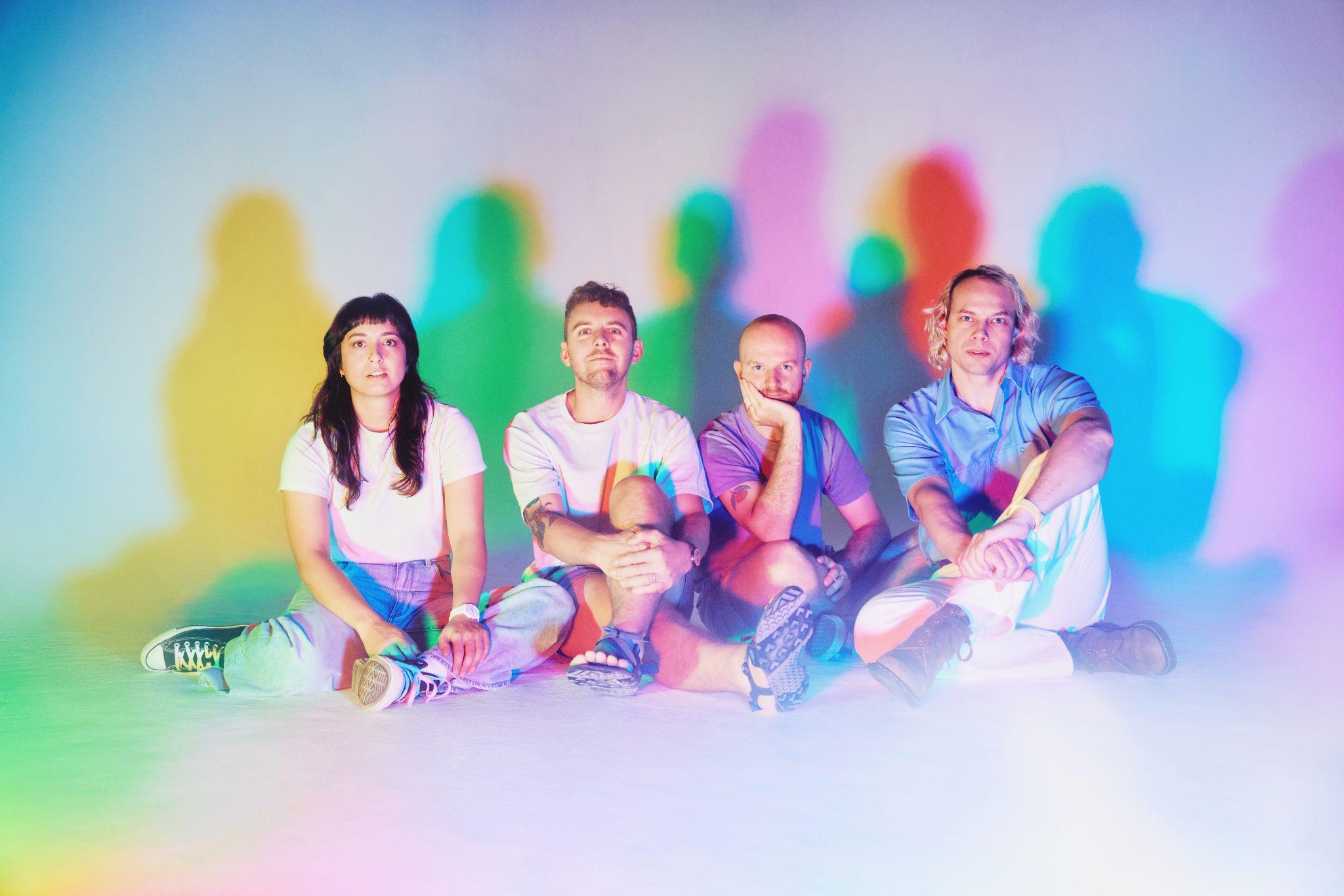Stu Mackenzie is calling me from the future -- which, frankly, is to be expected. For the past 10 years, his mondo psych-rock band King Gizzard And The Lizard Wizard have been hurtling through life as if they activated a 2x speed setting for the universe -- always creating, always evolving, always on to the next thing while we’re still making sense of the current one. (It’s entirely possible they’ve completed another album in the time it’s taken you to read this sentence.) However, in this case, Mackenzie’s Zoom call isn’t coming from another dimension, but rather the other side of the international date line: My Thursday 8PM in the EST zone is his Friday 10AM in Melbourne.
That may seem like a relatively early hour for Mackenzie to be tending to promotional duties; this is, after all, a guy who sings about sleep about as often as his Aussie compatriots AC/DC deploy thinly veiled metaphors for their genitalia. But Mackenzie no longer has the luxury of snoozing past noon. About seven months ago, his household acquired a new human alarm clock in the form of his baby daughter. Fans can rest assured that new fatherhood won’t disrupt the Gizzard’s infamously furious rate of output: Today, the band release Butterfly 3000, their third new album in less than a year, following last November's K.G. and February’s companion record, L.W. But if becoming a parent hasn’t exactly affected Mackenzie’s work ethic, it’s certainly changed his outlook. "During the pandemic," he says, “I’ve had times of productivity, but then also just extreme discontent -- like, 'What's the point in doing anything?' There's just less stimulus input into the brain, which I think is bad for creativity, at least for me. The less I do, the more I find it hard to create stuff. So my daughter has been a nice arrow to point through this whole crazy time, and something to just reorient any negativity.”
That shift is apparent within the opening seconds of Butterfly 3000, an album that sees King Gizzard moving away from apocalyptic guitar-charged epics toward more compact synth-based statements, and composing every song in a major key. As Mackenzie tells it, the impetus for Butterfly 3000 extends back to the ambient interludes he created for the band’s 2020 concert film/soundtrack, Chunky Shrapnel, whose arsenal of vintage Moogs and newer Eurorack synths formed the bedrock of the new record. “We started making these arpeggiated loops, which are littered throughout the film,” he recalls. “And that just felt like an inspiring little idea that was so simple. The synth we were using has really rudimentary sequences that are just random combinations of notes. We were drawn to the off-kilter amounts of notes -- these weird time signatures coming from the synthesizer, rather than drums. We were being led by the capabilities of the technology, so I just thought, ‘I'm going to have an open mind and see where this path leads.'”
But from that experimental starting point, King Gizzard magically arrived at their most generously melodic and open-hearted album to date. It wouldn’t be accurate to call Butterfly 3000 the band’s synth-pop album. Their trademark motorik thrust is still in effect; it simply veers toward the more electro-curious side of the kosmiche-rock canon -- less “Mother Sky,” more Harmonia. By trading in gonzo guitar jams for playfully percolating synths, King Gizzard have also displaced the dystopian tenor of their recent records for a certain stargazing optimism. It’s easy to imagine Mackenzie delivering the album’s blissful new-dad adages, cosmic koans, and falsetto chorus hooks with a beaming smile on his face. But even if it initially scans as a lighter, more pop-oriented release, Butterfly 3000 nonetheless boasts all the thematic resonance and conceptual connectivity of the group’s weightiest works. Mackenzie talked us through the album track-by-track to help us make sense of it all.
1. “Yours”
This is a great scene-setter for the record, both sonically and thematically. But while the synths are obviously the first thing you notice, I found it interesting how much this song -- and several others on the record -- are powered just as much by acoustic guitars. Were you consciously trying to offset the futurist qualities of the synths with more organic sounds?
STU MACKENZIE: Sometimes, we do set really strict boundaries around a record, like, "We won't use electric guitar on this record!" But we didn't deliberately do that here. It was just what felt right with the synths. We were trying to make something that felt less pessimistic. So much of our music is pessimistic, even if it is in a fast tempo. We lean on dark textures a lot. I find it a lot more challenging to write music that's bright. It just doesn't come naturally to me. And I suppose that was the challenge with this record. Maybe someone else could explain why an acoustic guitar sounds emotionally brighter rather than electric. I'm not sure why that is, but it just feels more innocent.
Maybe it’s because a lot of us first learn to play guitar on acoustic, so it conjures a certain childlike quality. Speaking of which, is it fair to say the lyrics to this song were inspired by new fatherhood?
MACKENZIE: There is a huge influence of that going through the record, and maybe part of the reason that it’s such a positive record is it was made in a really positive mindset. It was all written when I was about to become a father. To me, the main lyrical motif is the butterfly, and it represents a lot of different things in the record. It can represent me and it can represent my daughter as well, but it also can represent change or metamorphosis or lucidity or dreaming. This record is written from the perspective of someone watching over you who is like the Dream God -- like maybe it's Morpheus, the Greek god of sleep. The butterfly is a good omen on this record, and I suppose that's what this song is about.
2. “Shanghai”
King Gizzard played Shanghai in November 2019. Was this song directly inspired by your experiences there?
MACKENZIE: It is, actually. We had this one night/day in Shanghai, where we got the classic Szechuan hot pot and got really drunk and all went insane, basically. It was just a bizarre experience that makes sense to anyone who was there. But I suppose the song is also about that transformative element of travel -- again, written from the perspective of becoming a butterfly or changing or having a singular experience that feels like you're hatching from your cocoon. Shanghai felt like that to us. It was our first time there. I want to go back.
I can only imagine hearing this song in the midst of a pandemic where travel has largely been grounded must be very bittersweet for you.
MACKENZIE: It is. And it feels even more decadent to travel than it did before. I feel very grateful for the travel I've done. I can't wait to get back to it again. And I think I'm going to appreciate it a significant amount more now.
3. “Dreams”
When this album was serviced to media, we were given the option of listening to all 10 songs as a single continuous track. And this track provides some rationale for that, since it plays off some of the sonic motifs of “Shanghai” before it. At what point does that sort of connectivity come into play? Is that something you're conscious of from the very start, or is it something that reveals itself the deeper you get into making a record?
MACKENZIE: It's different for us record to record. Some records that we make are ultra-connected, and some are less so. This one, I think of as being quite connected. The first two songs written were "Dreams" and "Black Hot Soup," and lyrically, they were written independent of each other. But then it started to feel like, "Oh, hang on, this is kind of like a lyrical journey. I'm starting to see how this song is chapter three and this one is chapter eight. We just need to fill in all these gaps. And I've got these other ideas that are half finished, or there's this other riff over here that maybe I can use in chapter five, or chapter two." It all felt like a giant puzzle that needed to be arranged.
Your last few records have been very topical, but here you’re blissfully singing, “I only want to wake up in my dream.” Was there a deliberate escapist intent to the record?
MACKENZIE: I think so -- it's less a reaction to the last couple of records and more a reaction to the current state of the world. "Dreams" was written in early lockdown, and it's kind of grappling with the concept that this [pandemic] is going to go on for a long time. Most of the time when I approach writing, I don't approach it from this angle. This time, I was like, "I'm going to try and put a positive spin on this" -- which is probably what I'm like as a person, but it's not what I'm like as a writer. In Gizzard, it's like, "I'm not putting a fuckin' positive spin on this shit, I'm gonna give it to you raw!" But this record isn't that. It's like, "I want to wake up in my dreams, and it's gonna be fine."
4. “Blue Morpho”
Even though you’ve been talking about taking a more positive approach on this record, this track feels like it’s tapping into a more ominous spirit.
MACKENZIE: This was originally an outro to "Dreams." It was a short instrumental, maybe like a minute long. "Dreams" faded out and this was the reprise, but from another perspective, I suppose. From a conceptual point of view, I was trying to make it sound like you're going into your dream. After singing "I want to wake up in my dream," now I'm actually going into the dream. But it was one of those moments where the feedback from all the other guys in the band was like, "Nah, that's its own thing, that's a song!" So it was really just about stretching it out and letting it go in different ways in different places, and letting it be its own thing.
So for those of us not up to speed on lepidopterology, can you explain the significance of the blue morpho?
MACKENZIE: The blue morpho is a giant blue butterfly. I came across them in Nicaragua and they were just majestic and felt like they had power and agency over their place in the world. They're very easy to draw a metaphor from -- their life is insanely bizarre and beautiful and short. And then it's over. I think the blue morpho represents a lot of things on this record. It felt very fitting that this blue butterfly was going to reign over this record and be the motif.
5. “Interior People”
This feels like the real centerpiece track of the record, but even though it’s a very immediate, accessible song, the lyrics delve into some pretty dark themes about mental health.
MACKENZIE: It's another pandemic song. The lyrics were written by [guitarist] Joey [Walker] and when I read them, I was like, "Are you okay?" But he's playing on the metamorphosis/change-of-states motif. It's about questioning your sanity. Like, "Am I dreaming? Am I here? Am I real? Is this real?"
So then how do those sorts of lyrics wind up in such an anthemic track?
MACKENZIE: I remember that Joey had this concept of interior people before the lyrics were really written. I remember talking to him about the conceptual idea of the whole record, back when there were only two or three songs put together and there wasn't a huge amount of lyrics written. And he was like, "Well, I wanna write about interior people." And I was like, "That's cool, this is how that idea fits in the record." I don't know, the song just made sense to us. It didn't feel like a crazy juxtaposition with the music. Maybe that was a purposeful thing from Joey, but it felt right to me.
6. “Catching Smoke”
This feels like a companion piece to “Shanghai” from earlier in the record, in that it’s another song about getting completely shit-faced.
MACKENZIE: I think this is the most hedonistic song that we've ever written. In the narrative of the record, it was the one time we were allowed to do this and not feel guilty about it. And I suppose it's just about embracing that butterfly state, and about embracing that kind of [hedonistic] headspace and actively seeking it. You're moving on from "Interior People," where you're questioning if you're in it or not, and this song is about going there, even for one night.
Given the wild nature of the music you make, do people you meet on the road often just assume you want to party and get fucked up 24-7?
MACKENZIE: I don't mind if people think that. The main thing I try to escape is rock 'n' roll machoism and bravado. That's the thing that I have never wanted to be. But everyone parties, everyone wants to get fucked up sometimes. Human beings have been doing it since the dawn of time. Like, look at every culture and civilization in the world -- it's in our DNA. If we stopped making music and just talked about [getting fucked up] constantly, then you can hate me. But if we're still making lots of music, and we write a song or two about that, you know, I think it's fine.
This song features some really nice high-pitched harmonies from you and [keyboardist] Ambrose [Kenny-Smith]. I’m curious: As Australians, are the Bee Gees a big part of your DNA?
MACKENZIE: They actually are. It is hard to escape Bee Gees here. We are fortunate that we do have a handful of classic Australian artists who are also awesome. I mean, there's plenty of ones that haven't aged so well, but I think the Bee Gees catalog has aged particularly well, including their pre-disco '60s stuff.
7. “2.02 Killer Year”
When I first read the title of this one, I thought it was a typo on “2020.” What’s the meaning behind it?
MACKENZIE: This is the little section of the record that starts zooming out. You've kind of gone inward for a while, and on “Catching Smoke,” you're on this kind of trip, but now you start thinking about the world. Kiloyears are times in Earth’s history where there's been climatic events or extinction events, and I suppose "2.02 Killer Year" is a play on that -- meaning that we're in one right now. The song is about planet Earth being in one of those transitory states, and how spooky that is.
The lyrics in this song reference the Beach Boys (“It’s coming up Beach Boys/ It’s gonna be a lot of fun”), and I couldn’t help but wonder if you approached this song as if the Beach Boys were starting out today, writing songs about surf culture. Except now, thanks to climate change, “The waves are bigger than a house.”
MACKENZIE: We've written a lot of songs about climate change, and they're never happy -- like, who writes a nice song about climate change? And this isn't necessarily supposed to be one. But I think it's just trying to have that other perspective. Like, "Let's go surfing, the waves are massive!"
Is that Ambrose dropping the freestyle rap in the middle?
MACKENZIE: Yeah, he's kind of singing in a polyrhythm, which I was really quite impressed by. He’s a naturally gifted MC.
8. “Black Hot Soup”
You mentioned the Szechuan hot pots of Shanghai earlier, but judging by the lyrics to this one -- "Seething pot filled with hot liquid up to the top/ Spinning ball with molten core of iron ore" -- I have to think it’s about something more than soup.
MACKENZIE: I guess I'm talking about the universe, and it's just a further zoom-out. It's like: Maybe the universe is conscious. Maybe the universe is a butterfly. Is the universe alive? Can it dream? Can it think? It’s just further zooming out on our butterfly.
But this song ends with a pretty classic Gizzard noise-guitar freakout. How did that enter the picture on this otherwise synth-heavy record?
MACKENZIE: To me, this is almost like the first ending of the record, in a way. It actually was originally the ending of the record for a very, very long time. But I didn't want the record to end on a dark note. It just felt like a cop-out. The whole thing we were trying to achieve on this record was for it to not feel so ominous and sinister, because we've done that a lot of times before. The idea for the record was to keep zooming out, and for it to just feel bigger and bigger. We're talking about planet Earth or Gaia, and then we're talking about the universe, but it felt like maybe the nicest way to end it is to just go internal and ultra-personal: "I've been thinking about this whole idea of metamorphosis, and maybe now it's time for me to be the butterfly."
9. “Ya Love”
So from what you just told me, the last two songs on the record are kind of like the moment the star child appears at the end of 2001: A Space Odyssey -- the vastness of the universe distilled into a womb.
MACKENZIE: It is a little bit like that! I have seen that movie way too many times, so maybe the structure of that film crept in. This song is an interesting one. Cookie [AKA guitarist Cook Craig] wrote most of the musical elements, and it wasn't meant for this record. He sent a demo to me a long time ago, before the pandemic. I instantly gravitated towards it, but I couldn't finish it. It just didn't feel right until we started making this record. And I thought, "Oh yeah, there's that Cookie song that has that nice feeling" and has the same energy that a lot of the other songs on this record have. And we kind of reworked it to be in the same world as the other songs. There's a polyrhythmic kind of element with the keyboards and the drums being in different time signatures, and there's some extra-arpeggiated synths that come in. As soon as we started putting the musical elements together, it started to feel really obvious what I should sing about. I was about to have a kid and I was feeling insanely excited about that, and just feeling excited about the future. It's just an honest track.
Is this first King Gizzard track about love?
MACKENZIE: If it is, that must say something about me! I don't know. I want to say "Surely not," but you could be right!
10. “Butterfly 3000”
This last song feels like the flipside to “Ya Love." In contrast to the excitement of becoming a new parent, here it sounds like you’re grappling with the anxieties of bringing a child into this messed-up world. Was it hard for you to open up like that?
MACKENZIE: I admire singers and lyricists and writers and poets and people who can just write very, very honestly. And I think, through my lyrics, I’ve found my way to be honest, but it's very rarely been about my own experiences. And I think it's because I felt like I've had more interesting things to say than, like, "Oh, I fell in love with someone.” Well, so did everyone else in the world -- how is that interesting? But I felt like the sentiment of this song felt like something I hadn't heard too many times in music before. So it felt like, "Okay, this can be on the page."
So would it be safe to say these are the most personal lyrics you’ve ever sung?
MACKENZIE: Yeah, it's just an honest dialogue, or monologue. This song came about similarly to "Blue Morpho." It was originally an outro to "Ya Love," just a short reprise of the song. And again, it just started to feel like its own thing. I wanted something to wrap up "Ya Love" lyrically, and when I wrote these words, it became obvious that it was its own piece, and needed its own time and space to just exist separately. I guess, thematically, "Ya Love" is like, "I'm going through this change and I'm the butterfly," and "Butterfly 3000" is kind of like "It's time for my daughter to be a butterfly and spread her wings and be free." That’s why there is that anxiety attached to the lyrics, because that sentiment is kind of scary. But ultimately, it's still pretty exciting. And I think it wraps the record up in the way it was meant to.
Being a parent is a constant cycle of feeling excited and anxious, so in a way this last track connects back to the excitement of the first track, “Yours,” which sets the whole cycle in motion.
MACKENZIE: I like cyclical concepts and themes, and there's a huge amount of that in Gizz records. Many of our records can play on a loop, whether they're intended to be or not. They wrap up in a nice cyclical way, and this one does as well. Just like the life cycle of a butterfly. That's what we're going for.

Butterfly 3000 is out now via KGLW. Get it here.






